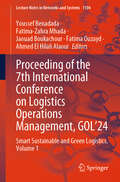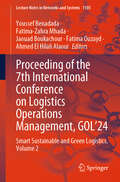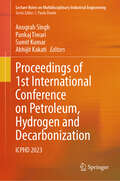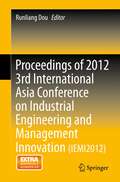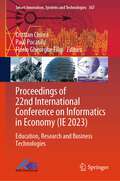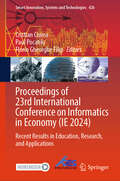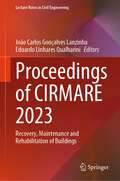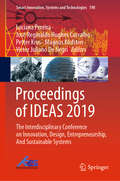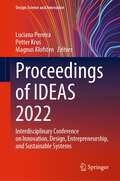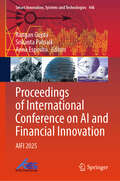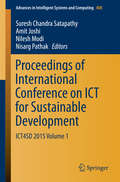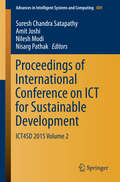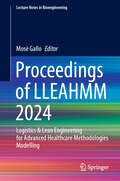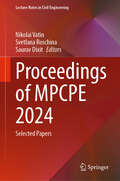- Table View
- List View
Proceeding of the 2nd International Conference on Tropical Agriculture
by Alim Isnansetyo Tri Rini Nuringtyas Anggoro Cahyo Sukartiko Siti Nurleily MarlianaThis book covers the sustainable tropical agriculture, sustainable tropical animal production and health, sustainable tropical forestry, socio-economic dimension in tropical agriculture and innovative and emerging food technology and management as chapters in this book. The common challenging problems in plant, animal, and fisheries production in the tropic are climate change, inefficiency production system, low technological innovation, decreasing environment quality, and the outbreak risk of pest and diseases.
Proceeding of the 7th International Conference on Logistics Operations Management, GOL'24: Smart Sustainable and Green Logistics, Volume 1 (Lecture Notes in Networks and Systems #1104)
by Youssef Benadada Fatima-Zahra Mhada Jaouad Boukachour Fatima Ouzayd Ahmed El Hilali AlaouiThis book presents the advances in the concept, model, method, and tools for the global supply chain management. The conference took place in Marrakesh from May 2 to May 4, 2024. The 7th edition of this conference focused on Smart Sustainable and Green Logistics. The papers included in the book's proceedings cover various themes, such as: . Metaheuristics for industry 4.0 . Multi-agent systems for solving combinatorial optimization problems . Sustainability in supply chain management: a paradigm for global transformation . Sustainable and agile supply chain management . Sustainable and smart management of water resources: innovative optimization . Artificial intelligence and emerging technologies: advancements and applications . Artificial intelligence techniques and statistical modeling for mobility and urban logistics planning . Smart and green process in transport and logistics . Viability of logistics networks, structural dynamics and recovery strategy—low certainty context . Modeling, simulation and optimization . Planning and scheduling . Decision support systems . Risk management . Project management . Information systems integration . Supply chain design and control . Models and algorithms for electric mobility
Proceeding of the 7th International Conference on Logistics Operations Management, GOL'24: Smart Sustainable and Green Logistics, Volume 2 (Lecture Notes in Networks and Systems #1105)
by Youssef Benadada Fatima-Zahra Mhada Jaouad Boukachour Fatima Ouzayd Ahmed El Hilali AlaouiThis book presents the advances in the concept, model, method, and tools for the global supply chain management. The conference took place in Marrakesh from May 2 to May 4, 2024. The 7th edition of this conference focused on Smart Sustainable and Green Logistics. The papers included in the book's proceedings cover various themes, such as: . Metaheuristics for industry 4.0 . Multi-agent systems for solving combinatorial optimization problems . Sustainability in supply chain management: a paradigm for global transformation . Sustainable and agile supply chain management . Sustainable and smart management of water resources: innovative optimization . Artificial intelligence and emerging technologies: advancements and applications . Artificial intelligence techniques and statistical modeling for mobility and urban logistics planning . Smart and green process in transport and logistics . Viability of logistics networks, structural dynamics and recovery strategy—low certainty context . Modeling, simulation and optimization . Planning and scheduling . Decision support systems . Risk management . Project management . Information systems integration . Supply chain design and control . Models and algorithms for electric mobility
Proceeding of the International Science and Technology Conference "FarEastСon 2020": October 2020, Vladivostok, Russian Federation, Far Eastern Federal University (Smart Innovation, Systems and Technologies #227)
by Denis B. Solovev Viktor V. Savaley Alexander T. Bekker Valery I. PetukhovThis book presents the proceedings of the International Science and Technology Conference “FarEastCon 2020,” which took place on October 6–9, 2020, in Vladivostok, Russian Federation. The conference provided a platform for gathering expert opinions on projects and initiatives aimed at the implementation of far-sighted scientific research and development and allowed current theoretical and practical advances to be shared with the broader research community. Featuring selected papers from the conference, this book is of interest to experts in various fields whose work involves developing innovative solutions and increasing the efficiency of economic activities.
Proceedings of 10th International Conference on Building Materials and Construction: Proceedings of ICBMC 2025 (Lecture Notes in Civil Engineering #664)
by Tan Kiang HweeThis book presents the proceedings of 10th International Conference on Building Materials and Construction held at Okinawa, Japan on 21-24 Feb 2025. It showcases the latest advancements in sustainable building materials, construction techniques, and architectural design. From groundbreaking research to practical applications, this book is a must-have resource for researchers, engineers, architects, and industry professionals looking to stay at the forefront of the construction industry.
Proceedings of 1st International Conference on Petroleum, Hydrogen and Decarbonization: ICPHD 2023 (Lecture Notes on Multidisciplinary Industrial Engineering)
by Sumit Kumar Pankaj Tiwari Anugrah Singh Abhijit KakatiThis book presents the select proceedings of the International Conference on Petroleum, Hydrogen and Decarbonization (ICPHD 2023). It offers a comprehensive overview of the research and advancement in traditional fossil fuel, hydrogen energy and imperative of decarbonization. The topics covered in book include petroleum exploration and production, petroleum reservoir engineering, enhanced oil recovery, hydrogen generation, transportation, storage and usage, carbon capture, utilization and storage, corrosion management for petroleum, hydrogen and decarbonization. This book will serve as a valuable resource for researchers, policymakers and industry professionals, offering diverse perspectives and insights into the ongoing efforts to transform the petroleum industry, integrate hydrogen technologies, and achieve global decarbonization goals.
Proceedings of 2012 3rd International Asia Conference on Industrial Engineering and Management Innovation (IEMI2012)
by Runliang DouThe purpose of the 2012 3rd International Asia Conference on industrial engineering and management innovation (IEMI2012) is to bring together researchers, engineers and practitioners interested in the application of informatics to industrial engineering and management innovation.
Proceedings of 2013 World Agricultural Outlook Conference
by Shiwei XuFood security has always been a major global concern and is getting more attention in recent years. In fact, the global economy and stability has been severely challenged by the precarious state of food security, which was exacerbated by a combination of sharp price volatility and disastrous weather conditions related to climate change. The book aims to improve the analysis and projection of agricultural production and marketing, facilitates information exchange to better food supply and demand and ultimately contributes to enhance world food security and sustainable global agricultural development.
Proceedings of 2014 1st International Conference on Industrial Economics and Industrial Security
by Menggang Li Qiusheng Zhang Runtong Zhang Xianliang ShiThis book collects 88 papers on the latest fundamental advances in the state of the art and practice of industrial economics and industrial security theories and practices, providing insights to address problems concerning the national economy, social development and economic security. The book is divided into four main sections: Industrial Economics; Industrial Security; Empirical Studies; and others, all of which cover different aspects, such as industrial organization, industrial structure, industrial development, industrial distribution and industrial policies, as well as theories on industrial security in globalization. It also covers four special sessions: Cultural Industry; National Economy; Finance Groups; and International Economics and Trade. The papers in each section describe state-of-art research works that are often oriented towards real-world applications and highlight the benefits of related methods and techniques for developing the emerging field of Industrial Economics and Industrial Security.
Proceedings of 2015 2nd International Conference on Industrial Economics System and Industrial Security Engineering
by Menggang Li Qiusheng Zhang Juliang Zhang Yisong LiThis book collects high-quality papers on the latest fundamental advances in the state of the art and practice of industrial economics study and industrial security engineering, providing insights that address problems concerning the national economy, social development and economic security. The book is divided into major sections including Industrial Economics; Industrial Security; Empirical Studies; and others, all of which cover different aspects, such as industrial organization, industrial structure, industrial development, industrial distribution and industrial policies, as well as theories on industrial security in a globalized world. The papers in each section describe state-of-art research works that are often oriented on real-world applications, and highlight the benefits of related methods and techniques for developing the emerging fields of Industrial Economics and Industrial Security.
Proceedings of 22nd International Conference on Informatics in Economy: Education, Research and Business Technologies (Smart Innovation, Systems and Technologies #367)
by Florin Gheorghe Filip Cristian Ciurea Paul PocatiluThis book includes high-quality research papers presented at 22nd International Conference on Informatics in Economy (IE 2023), which is held in Bucharest, Romania, during May 2023. This book covers research results in business informatics and related computer science topics, such as IoT, mobile-embedded and multimedia solutions, e-society, enterprise and business solutions, databases and big data, artificial intelligence, data mining and machine learning, quantitative economics.
Proceedings of 23rd International Conference on Informatics in Economy: Recent Results in Education, Research, and Applications (Smart Innovation, Systems and Technologies #426)
by Florin Gheorghe Filip Cristian Ciurea Paul PocatiluThis book includes high-quality research papers presented at 23rd International Conference on Informatics in Economy (IE 2024), which is held in Bucharest, Romania, during May 2024. This book covers research results in business informatics and related computer science topics, such as IoT, mobile-embedded and multimedia solutions, e-society, enterprise and business solutions, databases and big data, artificial intelligence, data mining and machine learning, quantitative economics.
Proceedings of 4th International Conference on Resources and Environmental Research—ICRER 2022 (Environmental Science and Engineering)
by Xin Wang Chaolei Yuan Suiliang Huang Zeyou ChenWith the rapid increase of population, industrialization, urbanization, and the abuse of science and technology, environmental problems have showed an explosive development trend. Actions must be taken to ensure the rational exploitation and utilization of natural resources, prevent environmental pollution and ecological damage, and coordinate the relationship between environment and social development. Proceedings of 4th International Conference on Resources and Environmental Research (ICRER 2022) focuses on effective use of environmental resources, ecological restoration and remediation of degraded and polluted environment, and emission reduction technologies. This book brings the latest advances in resources and environmental research.
Proceedings of 5th International Conference on Resources and Environmental Research—ICRER 2023 (Environmental Science and Engineering)
by Chaolei YuanThe field of resources and environmental research has seen a surge in interest and development. To compile the latest findings, this book presents peer-reviewed abstracts and papers from the 2023 5th International Conference on Resources and Environmental Research (ICRER 2023). This comprehensive collection offers insight into various areas including natural resource management, water resources and river basin management, solid waste management, soil, water, and air pollution control, climatic changes, ecosystem management, and sustainable development. This book provides professionals and researchers in the area of natural resources and environmental sciences with an up-to-date reference.
Proceedings of 6th International Conference on Resources and Environmental Research - ICRER 2024 (Environmental Science and Engineering)
by Chaolei YuanThis book compiles peer-reviewed papers from 2024 6th International Conference on Resources and Environmental Research (ICRER 2024), which was held in Hong Kong, China, from 6 to 8 December. The conference, held annually in the Asia-Pacific Region, serves as a platform for industry practitioners, policymakers, and researchers to exchange the latest advances in natural resources and environmental engineering. Topics covered in the book encompass natural resource management, water resources and river basin management, solid waste management, soil, water, and air pollution control, climatic changes, ecosystem management, and sustainable development.
Proceedings of CIRMARE 2023: Recovery, Maintenance and Rehabilitation of Buildings (Lecture Notes in Civil Engineering #444)
by João Carlos Gonçalves Lanzinha Eduardo Linhares QualhariniThis book highlights the latest advances, innovations, and applications in the field of resilience and adaptation of buildings and cities to climate change, as presented by international researchers at the VI International Conference on Recovery, Maintenance and Rehabilitation of Buildings (CIRMARE 2023), held in Covilhã, Portugal, on December 5–7, 2023. It covers a diverse range of topics such as accessibility of buildings and urban spaces, industrialization of rehabilitation processes, interventions in cultural heritage, building quality assessment, maintenance and requalification of built spaces, BIM and the digitization of construction, urban planning, circular economy in the construction sector, urban infrastructure rehabilitation, near zero energy buildings, urban resilience and climate change, recovery of degraded urban areas, service life, and pathologies in buildings. The contributions, which were selected by means of a rigorous international peer-review process, present a wealth of exciting ideas that will open novel research directions and foster multidisciplinary collaboration among different specialists.
Proceedings of ECSF 2021: Engineering, Construction, and Infrastructure Solutions for Innovative Medicine Facilities (Lecture Notes in Civil Engineering #257)
by Dmitry Ivanov Aleksandr Panin Inna SukhanovaThe book presents the latest advances, innovations, and applications in the field of innovative medicine facilities, as presented by architects and engineers at the International Scientific and Practical Conference Engineering, Construction and Infrastructure Solutions for Innovative Medicine Facilities, held in St. Petersburg, Russia, on May 19-21, 2021. It covers a wide diversity of topics, including the global challenges of our time and the challenges of developing the infrastructure of innovative medicine; current issues of engineering and construction of medical facilities during the pandemic; current issues of engineering and construction of biomedical research infrastructure; formation and development of a comfortable environment for the protection of public health; biological and environmental safety in the engineering, construction and technical operation of biomedical facilities. The contributions, which were selected by means of a rigorous international peer-review process, highlight numerous exciting ideas that will spur novel research directions and foster multidisciplinary collaborations.
Proceedings of FORM 2022: Construction The Formation of Living Environment (Lecture Notes in Civil Engineering #282)
by Pavel Akimov Nikolai Vatin Aleksandr Tusnin Anna DoroshenkoThis book gathers the latest advances, innovations, and applications in the field of environmental and construction engineering, as presented by international researchers at the XXV International Scientific Conference "Construction: The Formation of Living Environment", held in Moscow, Russia on April 20-22, 2022. It covers highly diverse topics, including sustainable innovative development of the construction industry, building materials, reliability of buildings and constructions and safety in construction, modelling and mechanics of building structures, engineering and smart systems in construction, climate change and urban environment. The contributions, which were selected by means of a rigorous international peer-review process, highlight numerous exciting ideas that will spur novel research directions and foster multidisciplinary collaborations.
Proceedings of IDEAS 2019: The Interdisciplinary Conference on Innovation, Design, Entrepreneurship, And Sustainable Systems (Smart Innovation, Systems and Technologies #198)
by Luciana Pereira José Reginaldo Hughes Carvalho Petter Krus Magnus Klofsten Victor Juliano De NegriThis book presents the proceedings of the IDEAS Conference, which is intended as a forum for a new generation of researchers. IDEAS is an arena that encourages researchers to defy their field's boundaries, leveraging disciplinary mindset into contributions to broad domains within the Science, Technology, Engineering, Entrepreneurship, and Management. Further, IDEAS explores novel questions and challenges existing policies and practices on how to apply science and technology as an input to design more innovative and sustainable systems that promote human well-being.
Proceedings of IDEAS 2022: Interdisciplinary Conference on Innovation, Design, Entrepreneurship, and Sustainable Systems (Design Science and Innovation)
by Luciana Pereira Petter Krus Magnus KlofstenThis book explores the cutting-edge ideas that are shaping the future of innovation, design, entrepreneurship, and sustainability. The proceedings of the interdisciplinary Conference on Innovation, Design, Entrepreneurship, and Sustainable Systems offer new perspectives on these topics. This book navigates the most recent research trends and practices, and gains unique insights on how to address innovation, design, and entrepreneurship on a sustainable basis. This book is an essential reference for anyone interested in staying up to date on the latest research, whether they are academics, designers, entrepreneurs, or sustainability enthusiasts. Get your copy now and take part in the debate about the future of sustainable innovation.
Proceedings of International Conference on AI and Financial Innovation: AIFI 2025 (Smart Innovation, Systems and Technologies #446)
by Anna Esposito Srikanta Patnaik Rangan GuptaThis book features high-quality research papers presented at the International Conference on AI and Financial Innovation (AIFI 2025), IIMT Bhubaneswar, Odisha, India, during February 7–8, 2025. The integration of artificial intelligence (AI) into financial services is ushering in a new era of technological transformation. The book discusses AI&’s ability to analyze large volumes of data, automate processes, and generate predictive insights which are revolutionizing how financial institutions operate. It also discusses how AI is becoming a critical tool for enhancing efficiency, improving decision-making, and fostering financial inclusion on a global scale. Furthermore, it presents contents on how integration of AI in payment systems, credit scoring, fraud detection, and regulatory compliance is reshaping the financial services industry, making it more secure, efficient, and accessible.
Proceedings of International Conference on ICT for Sustainable Development
by Suresh Chandra Satapathy Amit Joshi Nilesh Modi Nisarg PathakThe two volumes of this bookcollect high-quality peer-reviewed research papers presented in theInternational Conference on ICT for Sustainable Development (ICT4SD 2015) heldat Ahmedabad, India during 3 - 4 July 2015. The book discusses all areas of Informationand Communication Technologies and its applications in field for engineeringand management. The main focus of the volumes are on applications of ICTfor Infrastructure, e-Governance, andcontemporary technologies advancements on Data Mining, Security,Computer Graphics, etc. The objective of this International Conferenceis to provide an opportunity for the researchers, academicians, industrypersons and students to interact and exchange ideas, experience and expertisein the current trend and strategies for Information and CommunicationTechnologies.
Proceedings of International Conference on ICT for Sustainable Development
by Suresh Chandra Satapathy Amit Joshi Nilesh Modi Nisarg PathakThe two volumes of this bookcollect high-quality peer-reviewed research papers presented in theInternational Conference on ICT for Sustainable Development (ICT4SD 2015) heldat Ahmedabad, India during 3 - 4 July 2015. The book discusses all areas of Informationand Communication Technologies and its applications in field for engineeringand management. The main focus of the volumes are on applications of ICTfor Infrastructure, e-Governance, andcontemporary technologies advancements on Data Mining, Security,Computer Graphics, etc. The objective of this International Conferenceis to provide an opportunity for the researchers, academicians, industrypersons and students to interact and exchange ideas, experience and expertisein the current trend and strategies for Information and CommunicationTechnologies.
Proceedings of LLEAHMM 2024: Logistics & Lean Engineering for Advanced Healthcare Methodologies Modelling (Lecture Notes in Bioengineering)
by Mosè GalloThis book provides state-of-the-art information on logistics and implementation of Lean Healthcare models, and showcases what industrial engineering and medical science can offer together to increase the value of patient-oriented healthcare in the next scenario 5.0. It covers a wide range of topics such as artificial intelligence models oriented to 5.0 healthcare sustainability, agile models and lean methods in healthcare, risk management models focused on healthcare systems, engineering of healthcare systems requirement, ontology and cognitive models on healthcare engineering, project management methods applied to healthcare innovation, medical informatics and bioinformatics, software methods and applications for biomedicine, emergency management models. The book gathers the refereed proceedings of the 1st International Conference Logistics & Lean Engineering for Advanced Healthcare Methodologies Modelling (LLEAHMM), held in Naples, Italy, on October 10-12, 2024.
Proceedings of MPCPE 2024: Selected Papers (Lecture Notes in Civil Engineering #576)
by Nikolai Vatin Svetlana Roschina Saurav DixitThis book gathers selected contributions in the field of civil and structural engineering, as presented by international researchers and engineers at the International Conference on Materials Physics, Building Structures and Technologies in Construction, Industrial and Production Engineering (MPCPE), held in Vladimir, Russia, on April 22–25, 2024. The book covers a wide range of topics including the theory and design of capital construction facilities, engineering, and hydraulic structures; development of innovative solutions in the field of modeling and testing of reinforced concrete, metal, and wooden structures, as well as composite structures based on them; investigation of complex dynamic effects on construction objects, and many others directions. Intended for professional builders, designers, and researchers. The contributions, which were selected by means of a rigorous international peer-review process, highlight numerous exciting ideas that will spur novel research directions and foster multidisciplinary collaborations.

